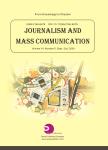Russian and English View on Lies in Conflict Dialogues—— Analysis of Conflict Communication Acts in Russian and English Fiction
Russian and English View on Lies in Conflict Dialogues—— Analysis of Conflict Communication Acts in Russian and English Fiction作者机构:Vladivostok State University of Economics and Service Vladivostok Russia
出 版 物:《Journalism and Mass Communication》 (新闻与大众传媒(英文版))
年 卷 期:2012年第2卷第8期
页 面:840-851页
学科分类:090703[农学-森林保护学] 0907[农学-林学] 081203[工学-计算机应用技术] 08[工学] 09[农学] 0835[工学-软件工程] 0812[工学-计算机科学与技术(可授工学、理学学位)]
主 题:telling lies conflict situations false utterances speech act
摘 要:What is a lie? Why do people tell lies? What compels them to make false utterances? How do people treat lie, deception or fudge? Is the attitude to them the same in different cultures? If not, what differences are there? An answer to these and some other questions is being sought in the paper. Producing a false utterance, the sender deprives the communication partner of the right to receive full information. The article presents views of Russians and representatives of Anglo-American culture on telling lies drawing the readers' attention to very serious situations, such as family conflicts between spouses, aggravated with lies. The material for analysis is taken from the texts by Russian playwright Anton Chekhov and the American novel writer Irwin Shaw. The analysis is based on the study of verbal and non-verbal markers of false utterances generated by quarreling spouses. A complex method of researching the literary material combining linguistic, extra-linguistic, and paralinguistic analysis of conflict speech acts with false utterances of different kinds is applied.



